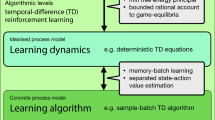Abstract
Today’s society is largely connected and many real life applications lend themselves to be modeled as multi-agent systems. Although such systems as well as their models are desirable, e.g., for reasons of stability or parallelism, they are highly complex and therefore difficult to understand or predict. Multi-agent learning has been acknowledged to be indispensable to control or find solutions for such systems. Recently, evolutionary game theory has been linked to multi-agent reinforcement learning. However, gaining insight into the dynamics of games, especially if time dependent, remains a challenging problem. This article introduces a new perspective on the reinforcement learning process described by the replicator dynamics, providing a tool to design time dependent parameters of the game or the learning process. This perspective is orthogonal to the common view of policy trajectories driven by the replicator dynamics. Rather than letting the time dimension collapse, the set of initial policies is considered to be a particle cloud that approximates a distribution and we look at the evolution of this distribution over time. First, the methodology is described, then it is applied to an example game and viable extensions are discussed.
Preview
Unable to display preview. Download preview PDF.
Similar content being viewed by others
References
Börgers, T., Sarin, R.: Learning through reinforcement and replicator dynamics. Journal of Economic Theory 77(1) (November 1997)
Bueno de Mesquita, B.: Game theory, political economy, and the evolving study of war and peace. American Political Science Review 100(4), 637–642 (2006)
Feynman, R.P., Leighton, R.B., Sands, M.: The Feynman Lectures on Physics including Feynman’s Tips on Physics: The Definitive and Extended Edition. Addison Wesley, Reading (2005)
Gintis, C.M.: Game Theory Evolving. University Press, Princeton (2000)
Hirsch, M.W., Smale, S., Devaney, R.: Differential Equations, Dynamical Systems, and an Introduction to Chaos. Academic Press, London (2002)
Hofbauer, J., Sigmund, K.: Evolutionary Games and Population Dynamics. Cambridge University Press, Cambridge (2002)
Hon-Snir, S., Monderer, D., Sela, A.: A learning approach to auctions. Journal of Economic Theory 82, 65–88 (1998)
Maynard-Smith, J.: Evolution and the Theory of Games. Cambridge University Press, Cambridge (1982)
Nouyan, S., Groß, R., Bonani, M., Mondada, F., Dorigo, M.: Teamwork in self-organized robot colonies. Transactions on Evolutionary Computation 13(4), 695–711 (2009)
Panait, L., Luke, S.: Cooperative multi-agent learning: The state of the art. Autonomous Agents and Multi-Agent Systems 11(3), 387–434 (2005)
Phelps, S., Marcinkiewicz, M., Parsons, S.: A novel method for automatic strategy acquisition in n-player non-zero-sum games. In: AAMAS 2006: Proceedings of the fifth international joint conference on Autonomous agents and multiagent systems, Hakodate, Japan, pp. 705–712. ACM, New York (2006)
Shoham, Y., Powers, R., Grenager, T.: If multi-agent learning is the answer, what is the question? Artificial Intelligence 171(7), 365–377 (2007)
Sutton, R., Barto, A.: Reinforcement Learning: An introduction. MIT Press, Cambridge (1998)
Tuyls, K., Parsons, S.: What evolutionary game theory tells us about multiagent learning. Artificial Intelligence 171(7), 406–416 (2007)
Tuyls, K., ’t Hoen, P.J., Vanschoenwinkel, B.: An evolutionary dynamical analysis of multi-agent learning in iterated games. Autonomous Agents and Multi-Agent Systems 12, 115–153 (2005)
Weibull, J.W.: Evolutionary Game Theory. MIT Press, Cambridge (1996)
Author information
Authors and Affiliations
Editor information
Editors and Affiliations
Rights and permissions
Copyright information
© 2010 Springer-Verlag Berlin Heidelberg
About this paper
Cite this paper
Kaisers, M., Tuyls, K. (2010). Replicator Dynamics for Multi-agent Learning: An Orthogonal Approach. In: Taylor, M.E., Tuyls, K. (eds) Adaptive and Learning Agents. ALA 2009. Lecture Notes in Computer Science(), vol 5924. Springer, Berlin, Heidelberg. https://doi.org/10.1007/978-3-642-11814-2_3
Download citation
DOI: https://doi.org/10.1007/978-3-642-11814-2_3
Publisher Name: Springer, Berlin, Heidelberg
Print ISBN: 978-3-642-11813-5
Online ISBN: 978-3-642-11814-2
eBook Packages: Computer ScienceComputer Science (R0)




